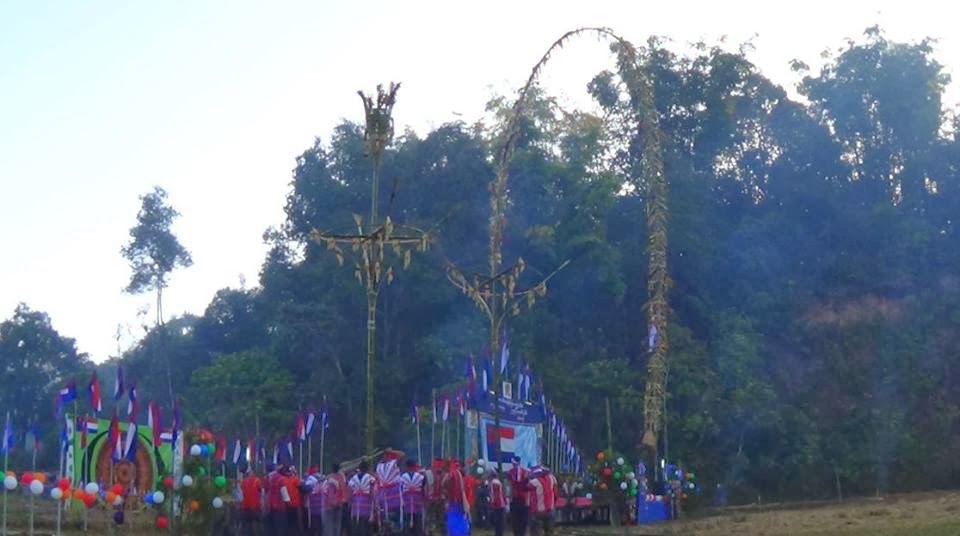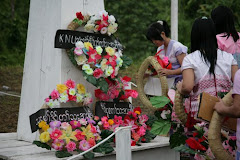Fabled Burmese Fighters Forgotten

In this January 2004 file photo, old soldiers of the Karen ethnic minority, take part in a ceremony marking the beginning of their rebellion in 1949 against the central government at a camp controlled by Karen rebel in Thai-Burmese border. (Photo: AP)
By DENIS D GRAY / AP WRITER Monday, August 2, 2010
MAE LA CAMP, Thailand — "Colonel Peacock, Major Hogan, Captain Bower ... Shoot from the hip! Quick march! Right turn!" The names, ranks and barked commands of World War II British officers tumble from these old Asian soldiers' memories as if it all happened yesterday.
A Karen refugee brings out two medals won by a relative during World War II when the ethnic minority sided with the British against Japanese. (Photo: AP)
But the war never really ended for the Karen tribesmen who fought with the British to drive the Japanese out of Burma, and who now live as refugees in jungle camps astride the Thai-Burmese border or inside their ravaged homeland, impoverished and driven from their homes in a brutal insurgency.
These ethnic minority people, who were made promises by the British that were fatally broken, remain virtually forgotten and unrewarded by the outside world as the 65th anniversary of the Allied victory in Asia approaches on Aug. 15. For them, medals, parades and joyous family reunions all ring hollow.
Yet the Karen warriors, all in their 80s and 90s, have forgiven their former allies—and even remember them with stirring fondness.
"As I bent down to pull him away, the bullet hit me here," recounts Sein Aye, pointing to a reddish scar on his neck. The Japanese had ambushed his unit, and the teenage soldier, recruited from a farming village, dragged a gravely wounded British officer to safety under fire.
Simeon U—91 years old, twice wounded, four times decorated—recalls killing at least five Japanese "with my own hands" and staying behind their lines when the bulk of the battered British force retreated in 1942.
He fought in the hills as a guerrilla with Maj Hugh Paul Seagrim, a lanky man nicknamed "Grandfather Longlegs."
The Japanese announced that their reprisals would end if Seagrim surrendered, so the officer walked into their camp, only to be executed with seven Karen companions. He remains a legend among the Karen.
"He was a great chap. We trusted him. He inspired the Karen people," says Simeon U, squatting on the floor of a bamboo hut at Mae Rama Luang, a camp embedded in a remote valley housing 20,000 Karen refugees.
When the Japanese invaded, the Burma Independence Army, an armed group composed mainly of the Burman ethnic majority, joined them in hopes of wresting independence from Britain, the colonial ruler. Among their targets were the Karen, whom the British had much favored.
When the British retreated to India, some, like Seagrim, managed to stay behind and later were joined by other British soldiers infiltrated back into the country. They organized the Karen into a fighting force.
But for the Karen, the war did not end with Japan's defeat. In 1949, a year after Burma gained its independence, the tribe rose in rebellion, having failed to secure a state of its own as the British had promised. It would become the world's longest insurgency.
In 1989 the country's military rulers changed the country's name to Myanmar.
The struggle has taken a massive toll: an estimated half-million people driven from their homes in Burma's Karen State, some 150,000 of them living as refugees in Thailand.
The UN and human rights groups have detailed widespread killings, rape, torture, forced labor and burning of villages as the regime campaigns to deny the rebels support from the civilian population.
"We had nothing to eat. The Burmese soldiers came and stole our rice. We left with nothing," says Sein Aye. In his late 80s, he lives in a small hut in Mae La Camp, existing on rations from aid groups. He lists his worldly possessions as two sarongs, three shirts and a broken watch.
The veterans' plight was virtually unknown until 1998 when Sally Steen, a British aid worker with ancestral roots in colonial Burma, visited the border and met an 87-year-old ex-soldier who had served with the Burma Rifles. He was caring for a mentally impaired daughter, suffered from severe asthma and was destitute.
"When I asked him what I could do to help, he said, 'I'd like you to inform my officers,'" Steen recounts. "In other words, (he felt that) his officers still had a responsibility."
Steen had to form her own group, Help 4 Forgotten Allies, because support was not forthcoming from the British government.
"That is a dead duck. They will not give pensions. ... they are adamant," says Steen, who is based in England.
In the past, officials have said the Karen are ineligible because they fought alongside the British rather than in British units.
The Burma Forces Welfare Association exists in England to help the veterans, and used to give them annual grants of $110. The grants stopped in 2008 but some will be renewed, Steen said. Last year, her group gave about $65 to each of more than 150 veterans and their widows. She admits it was a "miserable sum."
Yet, few of the veterans show any rancour.
"The British government did its best to try to give us our own state," says Simeon U.
"Then, I did what I had to do. Now, I want the new generation, my sons, to take over and continue the struggle."
Ka Paw Say, who helped to clandestinely distribute Steen's grants to veterans inside Burma, said some of those he met imagined the British had come back to liberate them. "They were so thankful for the money, and they wanted some milk and bread which they had not eaten since the British days," he said.
In the refugee camp, after telling his life story to a visitor, Dwe Maung asks to sing a song. The words, in the Karen language, pour out loud and clear as though he was still a young, eager trooper. "When you hear the sounds of the buffalo horn, the soldiers will gather, ... Our flag will rise. We will fight bravely for king and country."
Exiled, widowed, nearly blind and almost penniless, the old fighter waves a dirty, rolled-up towel over his head and a joyous smile sweeps across his furrowed face.
Next to him, Sein Aye rises from his chair with the help of a long cane. Then he stands, parade-ground erect, and says goodbye to a visitor with a flawless British Army salute.
http://www.irrawaddy.org/highlight.php?art_id=19113



No comments:
Post a Comment